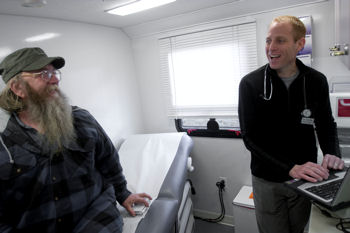Presidential candidates tackle problem of health care costs
Money, money, money.
Money, money, money. Presidential campaigns can't survive without it, the health care industry absorbs a lot of it, and it is the theme of this month's column.
Reducing the cost of health care administration is one of ACP's proposed goals for the next president (listed in the position paper Achieving a Higher Performance Health Care System, available). It's a tough proposal for anyone to disagree with, and not surprisingly, all of the presidential candidates have at least taken a stab at the problem of health care administration costs.
As with almost every issue in this campaign, the real divisions on this subject are between Democrats and Republicans. Those in the same party mostly agree with each other, although each candidate has a slightly different twist on the problem. (As usual, I'm including the positions of the top candidates of each party who were polling highest and collecting the most delegates in early primary states as of press time.)

The top Republican candidates plan to reduce the costs faced by all parties involved in health care (patients, employers, the government) by encouraging innovation in the private sector. Mike Huckabee particularly focuses on expanding health savings accounts, while John McCain wants to encourage competition among providers and alternative treatments.
The Republicans also highlight malpractice reform as an avenue to lower costs. Mr. Huckabee and Mr. McCain favor limiting non-economic damages in malpractice lawsuits, a cornerstone of ACP's program for reducing health care costs.
From the Democrats, the proposals for tort reform are more limited. Neither Hillary Clinton nor Barack Obama support restrictions on non-economic damages, but they have both proposed liability protections and other programs to encourage physicians to disclose medical errors to patients. Mr. Obama has also suggested that tighter anti-trust controls on malpractice insurers could lower physicians' coverage costs.
Since the Democratic candidates have very similar plans for the future American health care system (a mix of private and public coverage to provide universal access; see my January 2008 column for more details), the impact on administrative costs likely would be pretty similar, as well. Basically, the candidates say that the proposed universal coverage system would reduce the need for and cost of insurance companies' underwriting and marketing.
And, of course, Democrats and Republicans favor modernizing the health care system's electronic infrastructure. Support for electronic health records is about as much of a can't-lose stance as opposition to the high cost of health care, although the candidates are slightly less specific on where the funding will come from for physicians to move into this electronic future.
Speaking of where the funding comes from, if you want to learn more about where the candidates get their money, a Web site from the Center for Responsive Politics reveals a wealth of information about the sources of presidential campaign contributions. A warning: since the information is based on Federal Elections Committee filings from last October, the data are a little dated and don't include more recent swings in popularity such as Mr. Huckabee's Iowa surge.
Still, it's interesting to know which candidates have received the most money from pharmaceutical companies and health professionals. That would be Ms. Clinton, followed by Mr. Obama, and then Republicans Mitt Romney and Rudy Giuliani.
One has to wonder how much these numbers represent pragmatic concerns (giving to the likely winner) rather than ideological support, since the donations seem to align more with poll results than the interests of the donating industries (Ms. Clinton and Mr. Obama both favor government negotiation of drug prices and importation of prescription drugs).
And what about the other interest groups concerned about the policy surrounding health care administration costs? Not surprisingly, aggressive trial attorney John Edwards was popular among his fellow lawyers (ranking just below Ms. Clinton in donations) while Chris Dodd, who represents insurer-heavy Connecticut, was the top recipient of donations from the insurance industry. If you want to know even more about campaign donations, like which candidates your neighbors support (yes, it's really on there), check out the Web site.
While I'm recommending campaign-related Web sites, I should mention the new site from the creators of Healthcare Central, a network of disease information sites, breaks down the nuances of the candidates' positions on health care issues in an easy-to-understand and visually entertaining manner. Watch Mr. McCain's head fly across the screen when you click on drug prices. It's meant for patients, but it's useful for anyone who prefers to get their campaign information in a clearer, more engaging format than offered by the candidates' position statements.




